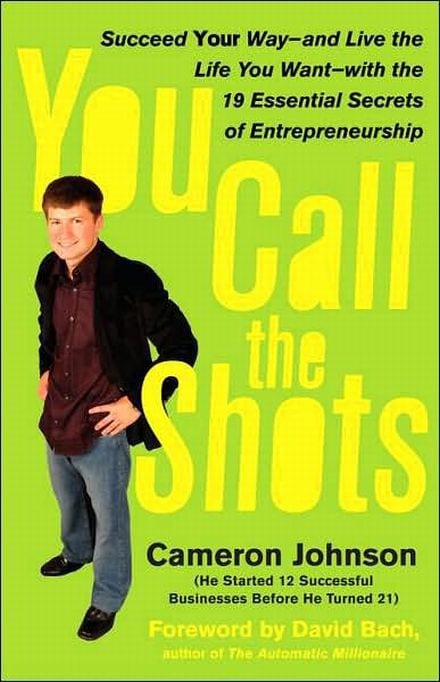
“You Call the Shots” by Cameron Johnson with John David Mann
Free Press, 272 pages
Available in hardcover, trade paperback, ebook, and audiobook
The best way to describe Cameron Johnson, although he hates the term, is as a whiz kid. By his own account, he started his first business—manufacturing and selling greeting cards using his home computer—at age nine. By the time he was 21, he had started and sold twelve businesses and made a mint doing it. He never says how much money he’s made with the sale of each business, but given that when he was in prep school and decided that he didn’t want to finish the year he had enough to repay his parents the $25,000 tuition they’d paid for the school year, you know he was pretty making good money at a young age. By the time he decided to do college, he knew more about the real ins and outs of business than his professors. He could have taught them.
Johnson grew up in very easy circumstances with parents who each owned businesses: His father was running the family Ford dealership—Magic City Ford, started by Johnson’s great-grandfather in Roanoke, Virginia—and his mom worked with a furniture business on her side of the family. It appears to have put the bug in him as well. (Having said that, just having successful parents isn’t always a guarantee of success. A lot of times, kids of parents who have accomplished a lot wind up being some of the worst when it comes to things like this.)
He credits his parents with always including him in business in one way or another. His dad often took him into the dealership, and when he was young, he had a cot in his mom’s office at the furniture store. In one way or another, he was surrounded by business and business conversations most of his life. And it seems he absorbed it well.
In “You Call the Shots,” Johnson tells his story, but each of the nineteen chapters is also dedicated to a particular skill necessary to entrepreneurs. Some of the skills are what you’d expect: putting yourself out there, finding a balance between work and life, being able to adapt, negotiation skills, using your money wisely and making it work for you, learning from great mentors (either in person or people you admire and want to learn from), and having hands-on experience.
He also emphasizes continual learning—training courses, listening to CDs while in the car, seminars, magazines, learning on the web, you name it—as invaluable to the entrepreneur.
A couple of the more unusual tips his passes along is using the power of the press. When he started his own business at age nine, he was written up in the local paper and was able to use that in expanding his business. And for several years, especially when he was young enough that age was a factor, he used it almost by default. Later, as he matured and grew savvier, he deliberately used the press as an advertising venue. A story about his winning second place in the National Junior Achievement competition was picked up by the Japanese business publication Nikkei, and that led to Johnson being brought over to Japan to speak for an internet learning company there.
While he doesn’t tell businesses to not advertise, quite often his view of advertising is that most businesses don’t spend their advertising dollars wisely. Cameron’s view is less is more. Use advertising in a very targeted way. Besides running his own businesses, he spent several years working at the family dealership and actually became the sales manager. In that experience, he changed how the dealership advertised, reducing their costs while getting a bigger return on the money spent.
His unusual success at such a young age led to him participating in the 2004 reelection campaign of George W. Bush.
He speaks openly about donating to his local Episcopal church from the beginning and finding ways to give back to the community.
As he tells his story, it seems obvious that from a young age, Johnson had an inborn knack for business. Perhaps some of that came from his parents and the atmosphere he grew up in. But even then at a young age, he seems to have had a natural understanding of researching and studying trends. As the story unfolds, even at a very young age, he was researching internet traffic patterns (all of his business ventures to date have been internet businesses) and market trends.
He had a natural attraction to these things, and it helped him, but skills can be learned as well, and that’s the point of his book. By learning the skills he outlines you can call the shots.
Johnson’s youth is much of the hook for the story—that he built and sold so many businesses at such a young age—but the principles outlined here are solid from any business perspective.
“You Call the Shots” is told with an engaging, easy-to-read style that flows smoothly. Credit for this has to be given to his coauthor, John David Mann, an experienced freelance business journalist.
I enjoyed the book quite a bit, and never found myself bogged down. It’s worth a look.




